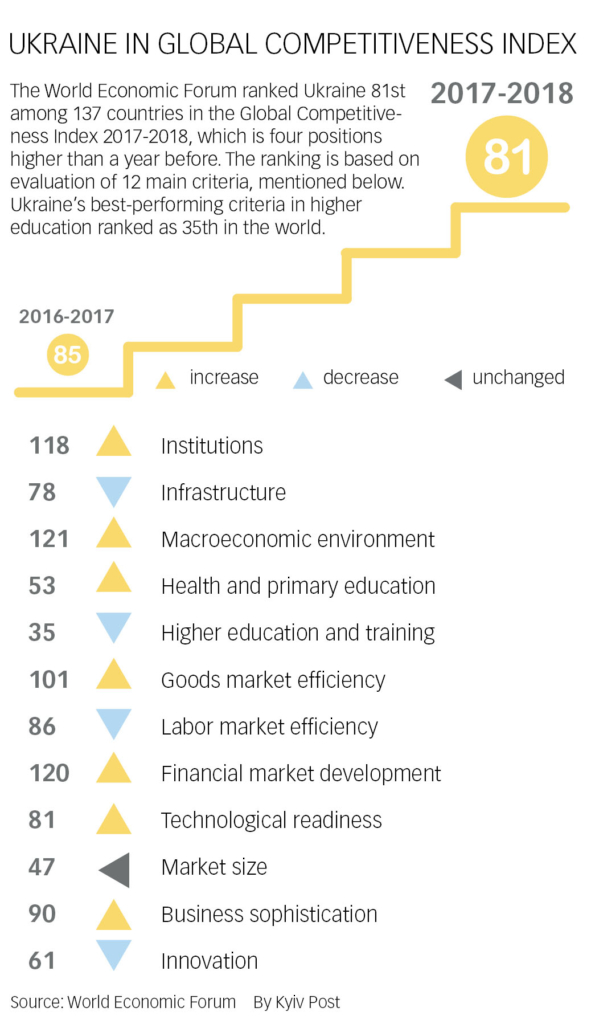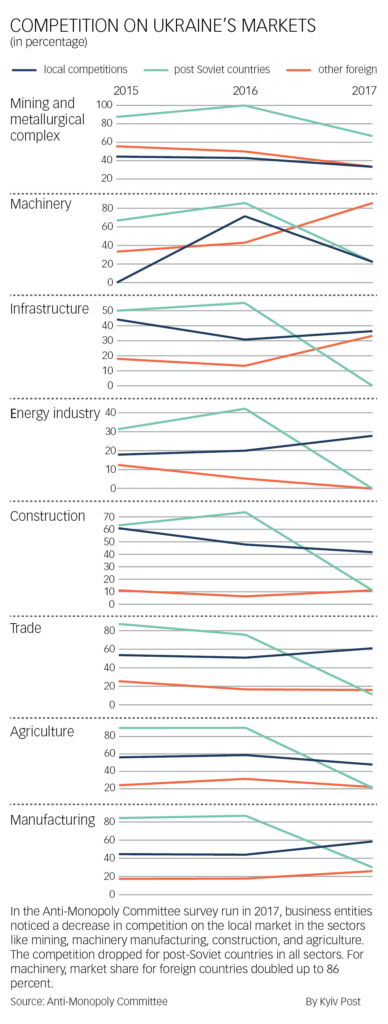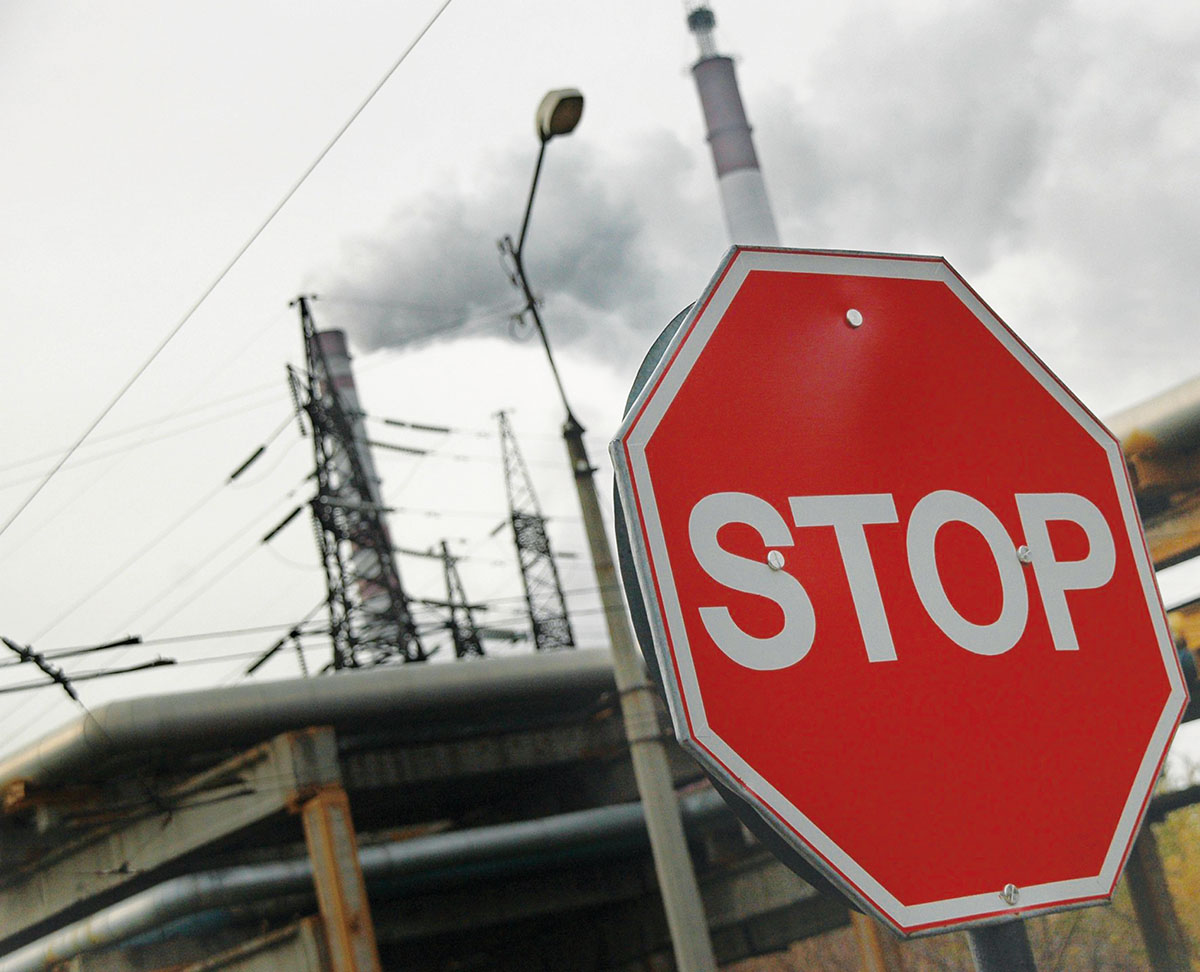Even though he hasn’t received any direct calls from oligarchs, Yuriy Terentyev, the chairman of Ukraine’s Antimonopoly Committee, or AMCU, prefers to go after big players. He says smaller ones are a waste of time.
The AMCU’s 2017 top cases include fining Russia’s gas monopoly Gazprom (Hr. 1.8 billion), oil company Ukrtatnafta that is linked to Ukrainian oligarch Ihor Kolomoisky through his Privat Group (Hr 1 billion), pharmaceutical companies Sanofi, BADM and Optima-Pharm (Hr 139 million), and Lifecell and Kyivstar telecommunications providers (Hr 40 million).
Altogether, the AMCU forced companies to cough up Hr 3.4 billion last year.
“The names of these companies… show that we are not afraid really to chase, to put uncomfortable questions to big companies,” Terentyev told the Kyiv Post on March 22. “We’re not just there to catch small businesses in order to be comfortable, because every conflict with a big name is a public conflict.”
Some though do try to question his independence, he says.
“From time-to-time, I might get some frankly strange requests from some people with regard to public procurement issues, which I simply ignore.”
Before joining the AMCU in May 2015, the ambitious 41-year-old worked for three years as the general counsel at ArcelorMittal Kryviy Rih, a steel producer and one of the largest enterprises in Ukraine. He also has 10 years of experience at Metro Cash and Carry in a variety of management positions: legal, financial controlling, compliance, internal audit and expansion coordination.
This set of skills impressed then Prime Minister Arseniy Yatsenyuk, who picked Terentyev for a seven-year term. Before being voted in by parliament, Terentyev was also interviewed by President Petro Poroshenko, then Finance Minister Natalie Jaresko, then Economy Minister Aivaras Abromavicius and the ex-head of the Presidential Administration, Boris Lozhkin.

Team reshuffling
To ensure loyalty and independence, Terentyev replaced a lot of staff members and took an active part in recruiting. “We indeed accelerated a lot of decision making, and not to the detriment of quality,” he said. “Over the previous 20 years, the main approach of the AMCU was to start a case, put pressure on a businesses, and by threatening to penalize them, try to make them behave properly.”
This left Terentyev’s team to inherit a whole pile of open cases.
Today’s total AMCU headcount is 750 people, of which 40 percent work in the central office and the rest are spread out in regions. The AMCU also has nine state commissioners, each with its own representative, which Terentyev oversees. He stresses the body’s effectiveness, efficiency, relevance and sustainability.
“Everything that we are doing should be properly organized,” Terentyev said. “We really have to achieve the best, the highest possible results with the limited resources that we have.”
The state body received only $4.5 million in 2017, but will get $7 million this year. About 80 percent goes to staff salaries, to keep them high enough to reduce bribe-taking. But it’s still a low amount. Turkey’s antimonopoly body, for example, receives 20 million euros for 380 people.
Teretyev restructured the AMCU into three main departments responsible for monitoring markets: one is responsible for energy and utilities; another for consumable and industrial goods; and the third for services and intangible products. A separate investigative department has been created as well. Smaller ones oversee mergers and acquisitions and public procurement.
“And I tried to fill the key management positions in these departments with the proper people,” Teretyev said.
The AMCU requires analytical, legal and investigative skills at a time when many suitable candidates are leaving the country. And “in many cases, postings for governmental positions attract the wrong people, so to say, they attract people with the wrong motivations, who want to join public service exactly for the reason we want to reform, in order not to have such people in these positions.”
Public tender work is becoming more intense, with complaints increasing from roughly 1,300 in 2014 to 5,700 last year, for review by only 20 people.
Challenges ahead
But compared to three years ago, the AMCU’s workload has lightened as the public was educated about its duties.
“We’re not responsible for all of the price controls, for improving product availability,” Terentyev said. “We’re there to investigate cases. If the price of petroleum goes up, it is not because of AMCU, it’s because there are some other ministries who should be doing their job.”
Since 2016, the AMCU has published a detailed annual report of its work to communicate its position on specific markets. For Terentyev, this report has become an important transparency tool. “One of the key values and ways of operating for governmental institutions is transparency,” he said.

Ensuring competitive environment
Ultimately, the purpose of the AMCU is not to bring down oligarchs, but rather police the competitive environment of Ukraine to halt the abuse of dominant positions.
“If you look at the different markets, I’d say that usually there’s never a single pure person, a single entity which is guilty. Usually, everybody is a bit guilty, also including the state, and the regulators. The best (solution) is to bring in all of the conflicting views, and get them to discuss a problem in front of you, and also put some sharp questions to them that they have to respond to. And that’s the only way to get the really best final decision.”
The AMCU focuses more on advocating market competition, rather than on enforcement. “Hardly any other authority does as much legislative review as we do.”
On a yearly basis, the AMCU receives 6,000 complaints.
“If you look at our colleagues from Spain to Poland, on a yearly basis they have from 20–200 decisions — no more,” he said. “What we have with our structure of enforcement is wrong. It means that we’re overloaded with way too many small cases, which don’t allow us to focus on the big things. We need to have 300 decisions, but these decisions need to be systematic, and they need to be relevant and effective. So they really need to be addressing the proper problem and really correcting, reacting not to effects, but to causes.”

Ukrtatnafta, 43 percent of which is owned by gas monopoly Naftogaz, is also linked to Ukrainian oligarch Ihor Kolomoisky through his Privat Group. Naftogaz also has a 50 percent plus one share in oil and natural gas company Ukrnafta, while at least 42 percent of the shares belong to Privat Group. Altogether, Ukrtatnafta and five other companies affiliated with Kolomoisky were fined Hr 1.4 billion ($53 million), for price rigging at one of Ukrnafta’s auctions. (UNIAN)
International cooperation
The AMCU collaborates with international partners such as the Organization for Economic Cooperation and Development, United Nations, International Competition Network, World Bank, U.S. Agency for International Development and European Union’s Twinning program. It also works with the U. S. Federal Trade Commission, which has two resident advisors stationed in Ukraine.
Terentyev is interested in learning from Romania, the Baltic States, Turkey and Latin America.
“If you look at Brazil, Argentina and Chile, these are all markets which have their oligarchs, their monopolists, multinational companies, a big share of grey market, and what… the competition authorities are doing is really remarkable.”
